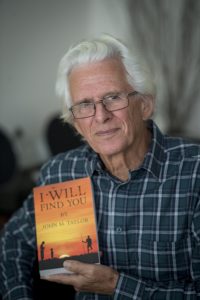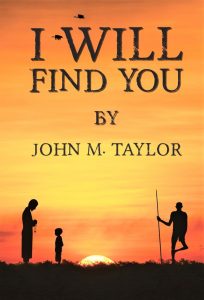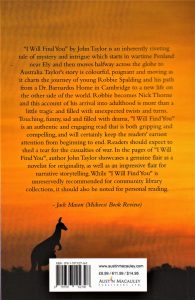I Will Find You is a tale of both human tragedy and kindness, mystery and intrigue which starts in wartime Fenland near Ely and then moves halfway across the globe to Australia. John Taylor’s story is colourful, poignant, and moving as it charts the journey of young Robbie Spalding and his path from a Dr. Barnardos Home in Cambridge to a new life on the other side of the world. Robbie becomes Nick Thorne and this account of his arrival into adulthood is more than a little tragic and filled with unexpected twists and turns, a story of strength, resilience, and determination in Nick’s efforts to find his mother. Touching, funny, sad and filled with drama, I Will Find You is an informative, authentic and pacey read, gripping and compelling, and will certainly keep the readers’ attention until the last page is turned. Expect to shed a tear for the casualties of war.
John M. Taylor’s book has over 65 5* reviews and was voted Book of the Year by Ely 2002 Book Club!
CommunityAd had the amazing opportunity of asking John a few questions about his book and his love of Folkestone.
So John, firstly tell our readers a little about your books?
Most of my publications have been technical or training manuals. I wrote fishing articles for a magazine in Australia and for two years wrote a column for Melbourne newspaper, again about fishing. Later, just for fun, I wrote verses about growing up in an English village immediately after WW2. The verses were never intended for publication but my wife sent them to a publisher. I received a four-page letter explaining why they liked them. So “Raising Fen Tigers” was published. I Will Find You is based on real life events it took almost seven years to research and write both in the UK and Australia. However, I must say that for almost two of those years I did not write. Simply put, I did not know how to deal with what I was being told. Now here we are, the book has been described as “epic”, “hard to put down,” “it draws you in” and “stays with you long after you have finished reading.” I’m always amazed at how many people say they read it twice in quick succession.
It follows the journey of a three-year-old boy, from a Fenland village near Ely, who in 1940 becomes separated from his mother and is taken to an orphanage in Cambridge. Then at the age of seven he is scooped up in the barbaric Child Migration Scheme. His name is changed and his records destroyed to prevent him being traced. “Hard to believe? Yet it happened to thousands of children between 1935 and 1965.” He finds himself in a notorious institution in Western Australia. Nick, aged eleven, runs away, he meets an Aboriginal boy named Gidga, and together they trek many hundreds of miles across the Outback to Gidga’s native village. An amazing journey using native survival techniques whilst avoiding police trackers. Nick lives in the village learning Aboriginal ways until he is fifteen when his circumstances change and he decides to set out on a daunting journey to find his mother. Yet he has a mountain to climb since he knows only institutional life and that of an Aboriginal village.
I spent many hours talking with former Child Migrants listening to their harrowing experiences. The Aboriginal research was absolutely enthralling much is included in the book. They are incredible, fascinating people. Western society could learn so much from them.
What inspired you to put pen to paper?
I enjoyed it and that someone else was prepared to read something I had written was surprising and motivational. For “I Will Find You” it was quite different. This story found me and demanded to be told, the people involved wanted their story told, they opened their hearts to me so I had to tell it for them.
Have you always had aspirations to be a writer?
No. Even now I do not consider myself to be a writer but a story teller. At school my English was terrible yet I was always able to tell a good yarn verbally*.
Do you remember the first thing you ever wrote? What was it?
Probably my name…..But seriously I don’t remember for sure, it may have been a monthly company newspaper.
What is it about Folkestone that you believe inspires creativity?
There is a vibrant community of creative artists, musicians and writers, it’s well supported and contagious! Folkestone is culturally attractive. Having lived here, even Charles Dickens though so. Maybe he started it all in Folkestone.
Why should our readers become your readers?
I write in a way that I believe people would want to read, I write as I speak*, making things flow naturally. I don’t show off with overly sophisticated or rare words causing the reader to break their flow by reaching for a dictionary to understand what the author is saying. I write to hold a reader’s attention all through and for them to enjoy and feel stimulated. Finally here, the answer can be seen in the 90+ 5 star reviews on the internet.
Anything else you’d like to add?
I enjoy Folkestone, it’s in our family blood. My father was raised here and is now on one of the hills overlooking the town where he played as a boy. I have lived in Switzerland, Saudi Arabia, South Africa, Australia, New Zealand and Papua New Guinea. Now retired it seems natural that this is where I should be.
If anyone wants a copy of I Will Find You, I have donated some signed ones to Chambers, a cultural coffee house on Sandgate Road. All profits go to Cancer Research.





